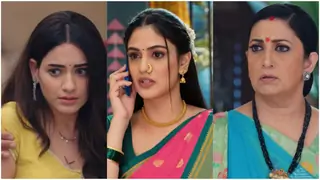Folks,
The bhool bhulaiyya, or maze, in the title is as much, or more, in our minds as onscreen, judging from the frenzied speculation across the forum about Who dunnit? Let us survey the usual suspects.
Mahaam Anga? She is not the one, I felt convinced, after watching her discuss the mystery both with Adham and with Resham. In fact, she seems very likely, partly to protect herself from any eventual finger pointing, to pursue her own investigation. That would, we can be sure, be effective, for she is the quintessential insider, plus she is of the same ilk, and would thus know both the psychology and the modus operandi of a serial poisoner - in this case a serial abortion inducer. I say serial, for as Ruqaiya tells Jalal, there have been many such cases earlier as well, of different begums in the harem suffering miscarriages.
However, we have to keep another angle in mind here. Mahaam is almost sure that Jodha is innocent., but this need not translate automatically into her being ready to prove this even if she could. Why? Because then it would be the Mughal insiders who would come under scrutiny, including herself and Adham,
Mahaam knows she is not guilty, and she believes the same of Adham. But no one knows better than Mahaam how easy it is, in those days if no technical/forensic evidence, to frame an innocent person. So she might very well choose to let Jodha & Co. be the safe scapegoats, in order to ensure that she and her son face no danger. She knows what Jalal's white hot anger can do, and she is really worried and afraid.
Adham Khan, with an astute female accomplice? The jury is still open on this one; remember the very odd look on his face in the closing shot of the segment with him and Mahaam? Moreover, by now he knows that his mother will condemn him unhesitatingly if he has done it and she finds out. He cannot even be sure that she will then shield him. So if it is he, he will keep rigorously tight-lipped.
Sharifuddin? The one factor repeatedly trotted out here is that the dature ka ark is made in his subedari of Amer. This is suggestive but, in the absence of proof of access to the kesar, hardly conclusive. Morever, as Poirot would have affirmed, the psychology is all wrong. Sharifuddin is direct and bullheaded, and his major grouse now against Jalal is about having had to return all the money he had extracted from Bharmal.
In all this, the Ruqaiya factor is very important, for she has the maximum stake in the whole web of deceit and murder being unravelled, including the past history of mysterious miscarriages in the harem, and the guilty punished. Plus, right now, she has the maximum influence on Jalal; he suspends the sentencing in the Diwan-e-Khas only after she nods her assent, and it is to her that he goes immediately after the hearing is over.
Jalal-Jodha: But to my mind, who did it is not so important as, firstly, who got it done, and secondly, what is going to happen, if and when the truth is discovered, to the key relationship in this tale, the one between our Odd Couple.
This is , right now, in extremely choppy waters. We know that it will not suffer irredeemable shipwreck, but as I wrote yesterday, it has gone back several steps in what was in any case always like an old fashioned minuet , in which a couple goes one step forward and then one step back.
Earlier, Jodha had the luxury of insisting that she hated Jalal, without any repercussions, for he allowed her to do so without imposing himself on her. He was often exasperated, even angry, and nowadays flirtatious and teasing. The latest was the onset of respect, admiration, and even genuine liking for the Amer ki shehzaadi. All that is now gone, and there is, in his eyes, only a relentless hatred that outweighs anything that she might ever have felt towards him. A hatred rooted in a terrible personal loss, and the belief that she did it to hurt him to the maximum. It is tough to negate that : Jodha's rescuing Rahim and her love for children will not, in Jalal's mind, outweigh the impact of her constant past refrain of wanting Jalal ka sar.
Thus the change is not so much in her hating Jalal more for this latest crisis, but of his hating her with a blind, unreasoning ferocity. That is new.
So the question now is not just How, after his behavior in this crisis, can she ever fall in love with him?. A wise and compassionate woman could understand where he is coming from and forgive him. Wives forgive their husbands all the time for atrocious behavior with far less of an excuse. The question rather is How, if she gets off merely because she cannot be proven guilty, and he continues to believe that she is guilty, can he fall in love with her? To cite Hercule Poirot once more, one can fall in love with a thief or a cheat, but not with a cold blooded murderer. So, Jodha has to be proved totally innocent, and not end up merely as not proven guilty.
This apart, as Jalal and Jodha stare at each other across the Diwan-e-Khas, the eyes of both filled with implacable anger and determination, I was struck anew by how very similar they both are. Both are stubborn to a fault, indeed bull-headed, each is arrogant and unyielding towards the other at present, both are fearless. In fact, what probably riles Jalal the most - apart from the conviction that he has let himself down badly by beginning to trust and care for a woman he now believes is a murderess - is that none of his ferocious threats can frighten her. She is still clear-eyed and defiant, and has the gumption to match stare for stare with him in the precap, and declare that she would not stand for it if he did anything wrong to her father.
It is this very fearlessness, and her unshakeable inner strength, that will one day move him once more to admiration, trust and affection, and then love. Right now, they act as a red rag to a raging bull, snorting head down, nostrils flared in fury. Poor Rajat, who is so subtle in very difficult scenes, but mad rage does not suit him.
The Case against Jodha and her brothers. Next, the evidence against Jodha and her brothers is not circumstantial. It is (concocted) physical evidence, and it is pretty tight. In Italy or France or England in the same period, the accused would have been executed on similar evidence, and often was.
Mansingh displays admirable sagacity in acknowledging that given the damning evidence against the Amer contingent, the Shahenshah was not at fault in doing what he did, and in making Bhagwan Das and the rest do the same. I had felt let down because I had pitched on young Mansingh as the Saviour in Chief, and all he could do was to extend a blanket assurance of innocence that meant nothing. But when he looked at the situation with such lucid and clear-headed detachment, I was moved to admiration. The kid will do his family proud.
It is true that by tracing the movement of the kesar and identifying all those who had access to it from the time Bhagwan Das brought it to Agra to the time he handed it over to Jodha at the jashn, Jodha could end up as not proven guilty.
This is precisely the point that Hamida Banu raises, and as we saw, she finally does manage to stem Jalal's insensate rage. He does not yet believe in Jodha's innocence, but with Ruqaiya too weighing in with her suspicion of an older and more deep rooted saazish , by a person or persons unknown, to prevent the birth of an heir, he has been given pause and he has started an investigation of his own. I wish he coopts Mahaam Anga in it, she would be far more insightful about harem matters than he.
It might be possible to prove that Jodha had no hand in it, but not so easy to do the same in the case of her brothers, for the kesar was back with them at the jashn, and they have a motive, the same one that was voiced by Mynavati when she learns whose baby is on the way, that this would lessen Jodha's standing in Agra.
It is pointless to argue that they would never risk any such thing with Jodha there as a potential prime suspect. All murderers operate with the conviction that they will not be found out, and indeed, if the Khwaja had not smelt the datura in Ruqaiya's breath, it would have been passed off an a natural miscarriage, just as all the earlier miscarriages in the harem over the years.
If the CVs do not suddenly abandon all logic, it is going to be tough for them to square this particular circle.
Hamida Banu: The CVs are obviously staunch admirers of Jodhaa Akbar, seeing how they import every element of note from the film into the serial. We can thus confidently look forward, a bit further down the road, to Jodha being sent back to Amer after the Sujamal fiasco, and also to the very charming one of Jodha writing Jalaluddin Mohammed in the Farsi script, and then learning that the Shahenshah cannot read.
But for now, the CVs have insisted that Hamida Banu should, as in the film, be Jodha's advocate and shield. So the gentle, twittering Ammijaan has suddenly metamorphsised into a haughty Malika Makhani , who informs her resentful son, with unmistakable hauteur and self assurance, that her will is subject to no one's diktats, and if she wants to visit her bahu begum, she will. Jalal realizes that he has run into a brick wall, and it is only in his plaintive, anguished remonstrance to her: Ammijaan, aap samajhti kyon nahin hain? Yeh mera dard hai, maine bachcha khoya hai! , that Rajat comes back into his own as a remarkable actor.
The other scenes - of Jodha and her mother-in-law, and the one in Jodha's rooms as Hamida performs the pooja in Jodha's place - are warm and extremely appealing. They are obviously meant to mute the unease caused by Jalal's mindless ferocity. For Hamida makes it a point to explain that he is so because he is in a rage, and that he will see the light once he calms down , and that in any case, there has never been, and never will be, any injustice done in the Mughal raj, and Jalal will make sure of it. Brave words, which one can trust only because, unlike Jodha, we know what will not happen.
Ruqaiya: She surprised me with her intelligent detachment, and her ability to immediately perceive the true significance of Hamida Banu's words in the Diwan-e-Khas to Jalal, about suspicious events in the past. Hamida is concerned only about Jodha and the recent past, but Ruqaiya's sharp mind goes farther back, and to very good effect. Her insistence that there is a different and far more deep rooted and older conspiracy against any heir to the Mughal empire, weighs with Jalal, and this would be of major, if unintended support for Jodha.
Jalal: The curious thing about the last two days is that even after allowing for the desperate grief and the sense of loss that are the deepest for him , practically every one around him - Hamida Banu, Mahaam Anga, Ruqaiya - seems to be more sensible and rational than the Shahenshah. In the beginning, when the miscarriage was announced, there was a Jalal II, who stood out against the fierce, unthinking rage of his alter ego, Jalal I. No longer. The Jalal who now prevails seems like some vengeful Aztec or Inca deity, demanding human sacrifices to assuage his grief and his fury.
It was, however, reassuring that the calm lucidity of his Ammijaan's appeal did have an impact on him, despite the fact that she ranks low within his personal relationships. That showed that Jalal II, though weak as yet, is still there and will come forward soon to tame Jalal I.
For now, Jalal does not seem to have started his investigation. There is a faint, very faint possibility that he means to tap Bharmal's knowledge of the Amer area where the ark could have been prepared. I must say, however, that his comment to his Minister about why he had invited Bharmal sounded far more ominous than promising.
Jodha: She seems almost like a transparent sheet of glass, which, in the correct lighting, is practically invisible. She seems to understand but little of what might well happen to her and hers; even in the jaws of carastrophe, all she thinks of is the reputation of Amer and the diya bati for her Kanha not being interrupted. Admirable stoicism, no doubt, but a bit more of coherent and intelligent thinking thru of her situation might have been more useful.
She does not even speculate as to the likely culprit: the contrast with Mansingh is striking. One has to remember that this is not some silly, giggling royal wench like Sukanya. This is Jodha, with the brains of a chess grandmaster and the acuity of mind of a fine duellist. What has happened to all that? We have yet to see what, if anything, about the case that she tells Jalal when she is summoned to meet him, but the precap does not sound at all promising, from either side. She is defiantly protective of her father, and he is, as usual, sounding mindlessly aggressive. One despairs of both of them, and is strongly tempted to say A plague on both your houses!
Shyamala B.Cowsik
NB: Historical footnote, which might interest those outraged by Jalal's announcement about the likely death sentence by public burning.
Yes, Jalal's saying they would be burnt alive in public if they were not proved innocent sounded horrible, but then those were brutal times. Blindings, severe torture, hanging, drawing and quartering, breaking convicts on the wheel, throwing them down an oubliette and leaving them, with broken bones, to die in pitch darkness, and lifelong imprisonment in horrible prisons without not just any hearing but even without any knowledge of the charges, under the infamous lettres de cachet - some or all these charming practices were common all over Europe during this period and for nearly 150 years late, till the early 19th century, and the end of the Napoleonic wars.
Then there were burnings at the stake for religious reasons, for the so-called apostates. The Catholic Church routinely burnt Protestants at the stake and vice versa. After Henry VIII of England, Queen Mary was Catholic, then Elizabeth I was Protestant & Church of England. So Mary burnt Protestants and Elizabeth burnt Catholics at the stake, though to be fair to her, it was very largely for political reasons, as many Catholics were plotting to assassinate her, with the active help of King Philip of Spain.
The Spanish Inquisition, of the Catholic Church, routinely 'applied the question'an euphemism for brutal torture on the rack, to suspected apostates, 'to save their souls'
So burning alive must have been, for the Mughals, just a variant on their other practice of walling convicted prisoners alive. More economical in terms to wall space, I suppose (that is black humour, don't take it seriously!). Down south, they used to have the convicted criminal buried up to his neck, and then get an elephant to knock his head off.
So all this would have been par for the course then. But I still feel that Jodha Akbar is becoming all too harsh and bitter. The conflicts in the film were more subdued, civilized, and overall far more graceful and credible.






























20